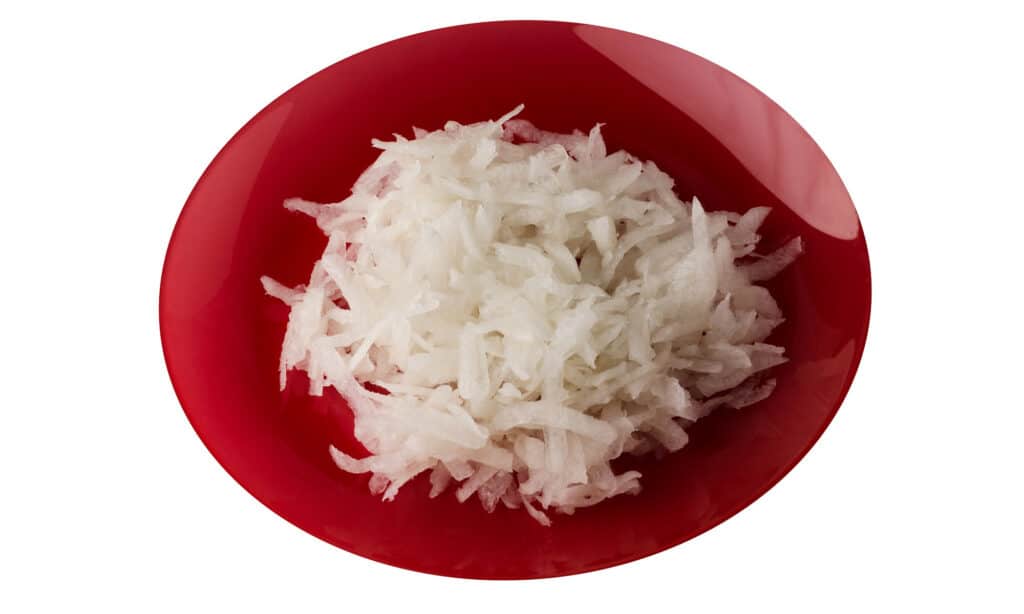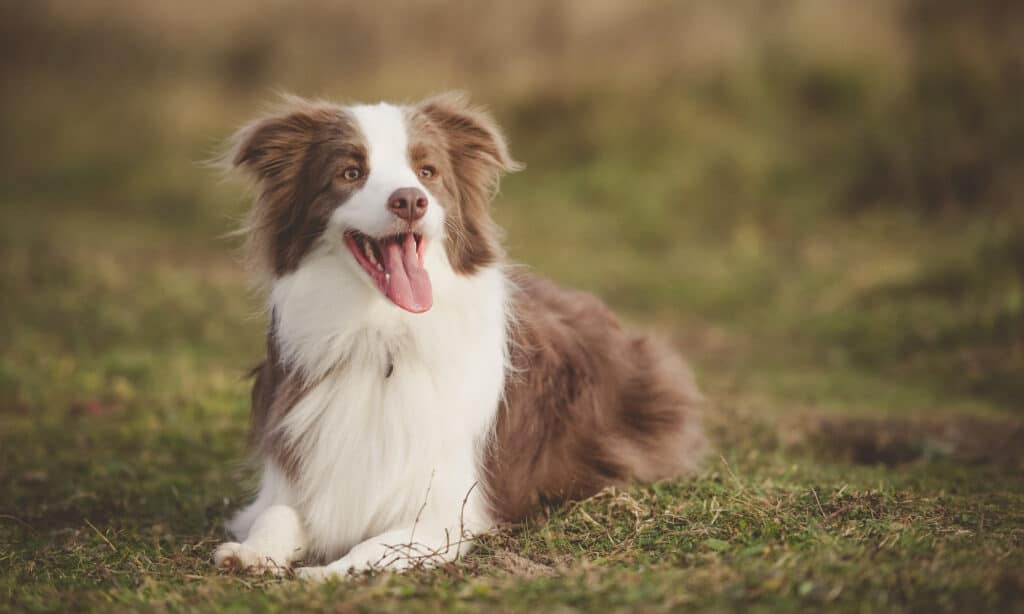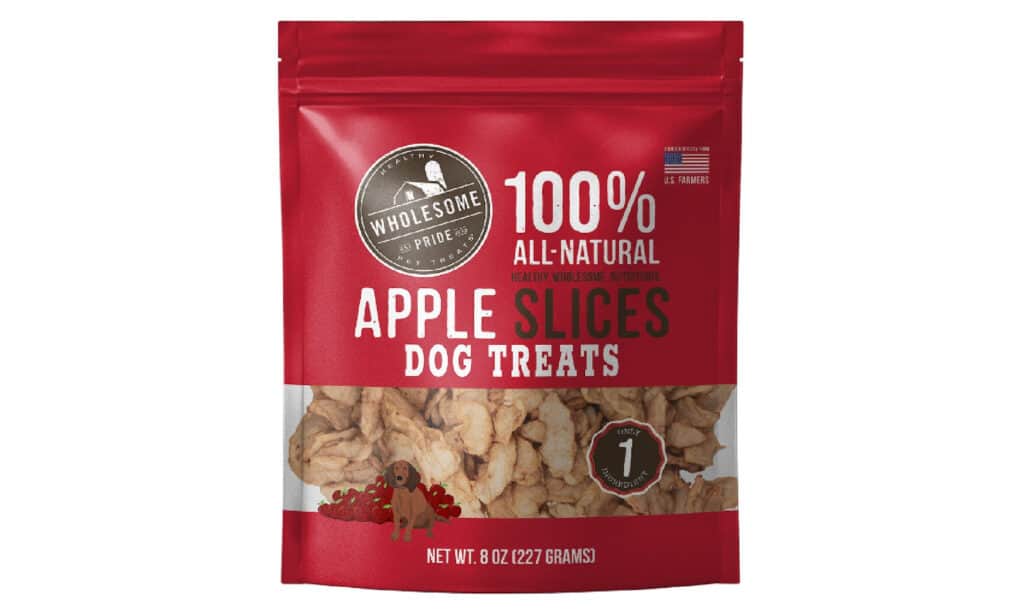What Is Daikon?
If you’re a dog owner, you may be wondering if it’s safe to feed your furry friend certain human foods. One such food that may pique your interest is daikon, a type of radish commonly used in Asian cuisine. While it’s always important to be cautious about what you feed your dog, you may be surprised to learn that daikon can actually be a healthy addition to your pup’s diet. In this blog, we’ll explore whether dogs can eat daikon and the potential benefits and risks associated with this tasty root vegetable. So, if you’re curious about incorporating daikon into your dog’s meals, keep reading to learn more!

Can Dogs Eat Daikon?
Daikon, also known as Japanese white radish, is a popular vegetable in many Asian cuisines. It’s low in calories and high in nutrients, making it a healthy addition to human diets. But what about dogs? Can they eat daikon too?
The good news is that daikon is generally safe for dogs to eat in moderation. It’s low in fat and high in fiber, which can help with digestion and promote bowel regularity. Daikon also contains vitamins C and B6, as well as potassium and calcium, which can all contribute to your dog’s overall health.
However, there are some important things to keep in mind if you’re considering feeding your dog daikon. First, make sure to cut the daikon into small, bite-sized pieces to prevent choking. You should also introduce daikon gradually to your dog’s diet, as sudden changes can upset their stomachs. And as with any human food, it’s important to monitor your dog for any signs of an allergic reaction or digestive issues.
Additionally, it’s important to note that daikon should never be a replacement for a balanced and complete dog food diet. While daikon can be a healthy addition to your dog’s meals, it should only be given as a treat or supplement.
Are There Any Harmful Ingredients in Daikon?
While daikon is generally considered safe for dogs to eat, there are some potential risks to keep in mind. One of the main concerns with daikon is its high fiber content. While fiber can be beneficial for promoting healthy digestion, too much fiber can cause gastrointestinal upset, including diarrhea and flatulence. Additionally, daikon contains goitrogens, compounds that can interfere with the thyroid gland’s ability to produce hormones. While goitrogens are not necessarily harmful in small amounts, excessive consumption of daikon could potentially lead to thyroid problems in dogs.
Another potential concern is the presence of oxalates in daikon. Oxalates are naturally occurring substances found in many plant-based foods, including daikon. In high concentrations, oxalates can cause kidney damage in dogs. However, the levels of oxalates in daikon are generally considered to be low and are unlikely to cause harm unless your dog consumes large amounts of the vegetable.

Are There Any Safe Ingredients in Daikon?
Daikon is a nutritious vegetable that can be a safe and healthy addition to your dog’s diet when given in moderation. One of the main benefits of daikon is its high fiber content, which can promote healthy digestion and regularity. Fiber can also help to reduce the risk of colon cancer and other digestive disorders in dogs.
Daikon is also a good source of vitamins and minerals that can support your dog’s overall health. For example, daikon is rich in vitamin C, which can boost your dog’s immune system and help to fight off infections. It also contains vitamin B6, which is important for maintaining healthy brain function and supporting the nervous system. Daikon is also a good source of potassium and calcium, which can help to support strong bones and healthy muscle function.
Another potential benefit of daikon is its low calorie content, which can be helpful for dogs that are overweight or prone to obesity. By replacing high-calorie treats with daikon, you can help your dog to maintain a healthy weight and reduce their risk of developing health problems related to obesity, such as diabetes and joint problems.
What Signs To Watch For If Your Dog Accidentally Ate A Lot of Daikon?
If your dog accidentally consumes a large amount of daikon, there are several signs to watch for that could indicate a potential problem. One of the most common issues associated with overconsumption of daikon is gastrointestinal upset, such as vomiting or diarrhea. This can be caused by the high fiber content of daikon, which can be difficult for some dogs to digest in large amounts.
Another potential concern with overconsumption of daikon is the presence of goitrogens, which can interfere with thyroid hormone production. Signs of thyroid dysfunction can include lethargy, weight gain, and changes in appetite or behavior. However, it’s important to note that the levels of goitrogens in daikon are generally considered to be low, and significant thyroid problems are unlikely unless your dog consumes large amounts of the vegetable on a regular basis.
If you notice any signs of gastrointestinal upset or changes in your dog’s behavior or appetite after they’ve consumed daikon, it’s important to monitor them closely and contact your veterinarian if necessary. Your veterinarian can help you determine the appropriate course of action based on your dog’s individual health needs and the amount of daikon they’ve consumed.

When or If You Should Go To The Vet?
If you suspect that your dog has consumed a large amount of daikon or is exhibiting any signs of illness after consuming the vegetable, it’s important to monitor them closely and contact your veterinarian if necessary. Depending on the severity of the symptoms and the amount of daikon consumed, your veterinarian may recommend bringing your dog in for an examination to determine the best course of treatment.
In general, it’s a good idea to contact your veterinarian if your dog exhibits any of the following symptoms after consuming daikon:
- Vomiting or diarrhea that persists for more than 24 hours
- Lethargy or weakness
- Loss of appetite or difficulty eating or drinking
- Signs of abdominal pain or discomfort, such as whining or pacing
- Unusual behavior or changes in mood or activity level
If you notice any of these symptoms, it’s important to act quickly to prevent any potential complications and to ensure that your dog receives appropriate care. Your veterinarian may recommend supportive treatments such as fluid therapy, anti-nausea medication, or dietary changes to help your dog recover.

Safe Dog-Friendly Alternative to Daikon:
If you’re searching for safe and nutritious alternatives to daikon for your furry friend, there are various options to consider. Carrots are an excellent choice as they are low in calories and high in vitamins and minerals such as vitamin A, potassium, and fiber. They are also a good source of beta-carotene which can aid in maintaining healthy vision and immune function in dogs.
Another alternative to daikon is green beans, which are rich in fiber and low in calories. They can help promote healthy digestion and bowel movement regulation in dogs. Moreover, green beans are a good source of various vitamins and minerals like vitamin C, vitamin K, and manganese.
Sweet potatoes are also a healthy option for dogs. They contain beta-carotene, fiber, potassium, and vitamin C, and are also low in fat and calories. This makes them an ideal choice for overweight or obese dogs.
Aside from these alternatives, there are many other dog-friendly vegetables that you can include in their diet. Examples are broccoli, spinach, peas, pumpkin, among others. Nevertheless, introducing new foods gradually and in moderation is crucial. By ensuring a well-balanced and nutritious diet for your dog, you can help promote their overall health and well-being.
Healthy Store-Bought Options:
In conclusion, daikon can be a safe and healthy addition to your dog’s diet when given in moderation and with caution. While there are some potential risks associated with consuming daikon, these are generally minimal and can be avoided by introducing the vegetable gradually and monitoring your dog’s reactions. Additionally, there are many safe and nutritious alternatives to daikon that can provide similar health benefits for your dog. By providing your furry friend with a balanced and varied diet that includes a variety of healthy foods, you can help support their overall health and wellbeing.
However, it’s always important to remember that every dog is different, and what works for one dog may not work for another. Always consult with your veterinarian before making any significant changes to your dog’s diet, and pay close attention to your dog’s reactions to new foods. With a little care and attention, you can help ensure that your furry friend stays happy, healthy, and well-nourished for years to come.
~Lindsie



